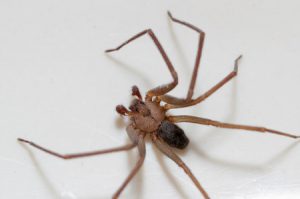Spider Scientists Turn to Twitter for Researching the Brown Recluse

Recluse spiders are pretty much universally hated and feared by most people. Considering their toxic venom and the pain they can cause with their bite, it doesn’t take a genius to understand why. Stories of bite victims are notorious, with almost every person you meet claiming they know someone who knows another person that was bitten by a brown recluse. But despite the numerous horror stories, brown recluse bites are actually rather uncommon, and getting your facts straight from the source without any embellishment can be a little tricky when that is the case. Urban legends unfortunately don’t provide much concrete data for scientists to study. In an attempt to learn more about recluse spiders as well as address peoples’ fears concerning them a team of spider experts from the U.S. and Canada have teamed up to launch a huge social media initiative they are calling Recluse or Not?
Matt Bertone from North Carolina’s State’s Department of Entomology and Plant Pathology and Eleanor Spicer Rice from the University of Toronto are leading the massive campaign. People are encouraged to send them pictures of spiders they think are a possible brown recluse to their project at @RecluseOrNot. They will go through the photos and deduce which spiders are a genuine brown recluse, and post those photos with each one’s particular location and habitat data. If the spider is not a brown recluse, then the actual species of spider will be revealed. This will help scientists study their location and habitats better a well as see which spiders are most often confused with recluses. They can then use this to help educate people about brown recluse spiders as well as numerous other species.
Bertone and Rice are hoping they can address the brown recluse’s bad reputation and provide a platform to educate the public on these cases of mistaken identity, and help them better understand the spiders around them. With the data they collect, the researchers will also be able to study and discover where brown recluse spiders actually reside in the country and keep tabs on these locations for recluse activity. They are hoping to help the public better-identify these arachnids and avoid stirring up unnecessary panic in spider situations that don’t warrant it.
Have you or someone you know ever been bitten by a brown recluse spider? Have you seen brown recluses around your home or spiders you thought might be recluses?











